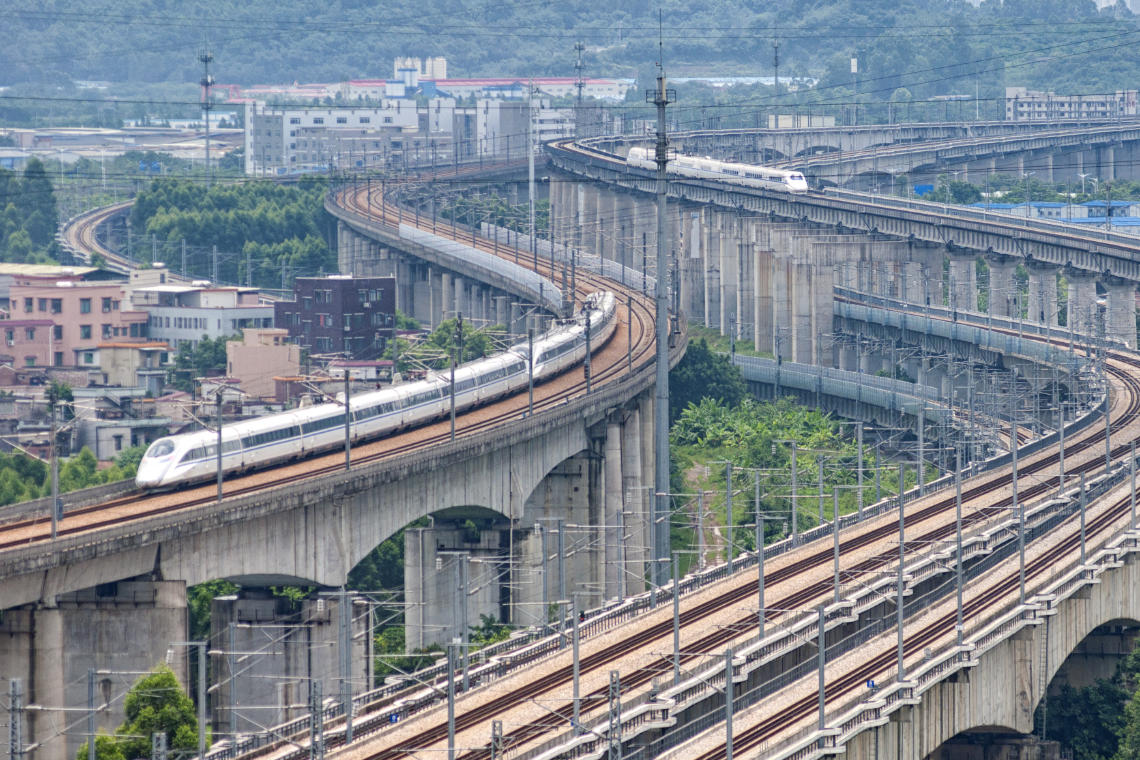News roundup: High-speed rail link between Shanghai and Kunming, plus Sinica Podcast with Carla Nappi
Top China news for November 22, 2016. Get this daily digest delivered to your inbox by signing up at supchina.com/subscribe.

High-speed rail link between Shanghai and Kunming
President Xi Jinping’s trip to South America to attend the Asia-Pacific Economic Cooperation (APEC) meeting in Lima, Peru, remains the top story on most Chinese central state media today, with Xinhua News Agency offering a package of stories about various aspects of the trip.
In addition, the People’s Daily has news of an upcoming high-speed rail route between Shanghai and Kunming, the provincial capital of Yunnan Province. Its mountain scenery and variety of ethnic minorities and traditions are popular with Chinese and international tourists; moreover, Kunming is the major Chinese city closest to Southeast Asia. The new route will open for business in December.
Finally, we publish on The China Project today the Sinica Podcast interview with Carla Nappi — author, history professor, scholar of the history of science in China, and prolific podcaster.
More China stories to watch are linked below.
BUSINESS AND TECHNOLOGY:
- Daimler executive removed after ‘racist rant’ in China / Financial Times
“Germany’s Daimler, parent of Mercedes-Benz, said it ‘sincerely’ apologized for the concerns raised by the incident,” in which a senior executive of the carmaker’s China business was “accused of yelling racist abuse during an altercation over a car parking space in Beijing.” This follows two tense points in recent German-Chinese relations, one a similar incident with Germany’s European commissioner, the other a canceled deal with German semiconductor company Aixtron. - Morocco wants to build a new city from scratch — with China’s help / Quartz
“If the Chinese firms build and finance this infrastructure, it is all to the good for Morocco. But chances are it will not happen,” said Deborah Brautigam, one of the world’s top experts on Chinese finance in Africa. The $10 billion project to house 300,000 people is the latest of many proposed Chinese-financed “special economic zones” in Africa, which have often progressed slowly, hampered by unreliable power and high transportation costs.
CURRENT AFFAIRS:
- Opinion: Trump’s art of the deal with China / WSJ
“If [Trump’s] track record as a businessman is a guide, he is likely to test China with an unorthodox opening move, the kind markets are unlikely to expect. A quietly achieved diplomatic agreement isn’t his style,” writes Alex Frangos. Rather than brashly slapping on tariffs, categorizing China as a “currency manipulator” and waiting for Beijing to retaliate, Trump may be more likely to seek deal making in infrastructure, step down his rhetoric, or even make compromises in the South China Sea in exchange for “some sort of agreement that makes the U.S. look like an economic winner, at least on paper.” - China touts its own trade pact as U.S.-backed one withers / WSJ
Asian countries are embracing free trade as the U.S. backs away, with Singapore, Malaysia and Vietnam all publicly announcing their intention to pursue the Regional Comprehensive Economic Partnership (RCEP), the China-led alternative to the apparently dead Trans-Pacific Partnership (TPP). Though Trump has promised bilateral agreements and countries like New Zealand appear interested, China’s foreign ministry aims to “achieve early results” with the RCEP. - Opinion: China is poised to benefit from Trump’s ambiguous Africa policy / Huffington Post
“There are early indications that some African countries may lean further into China’s embrace to compensate for what they expect could be a retrenchment in U.S. trade, investment and overall engagement on the continent,” write Eric Olander and Cobus van Staden of the China Africa Project. They discuss further with South African international relations professor John Stremlau in their China in Africa Podcast. - A trade war against China might be a fight Trump couldn’t win / NYT
Trump will start with little multilateral negotiating power and has given “a big push forward” to “China’s alternative system of rules,” writes The New York Times. “Many countries in the developing world still believe prosperity depends on their successful integration into the supply chains that traverse the global economy,” and the new American administration — unlike China — appears uninterested in helping them with that integration. - U.S. says won’t tolerate pressure from China on fugitive families / Reuters
Though a U.S. official quoted by Reuters wouldn’t deny that China’s “Operation Fox Hunt” had succeeded in facilitating the extradition of some Chinese graft suspects hiding in America, he said, “We’ve made clear that we will not tolerate any pressure being placed on family members or otherwise as a basis for return.” - U.S. and China conduct rare military drill / CNN
A “rare instance of cooperation” between the world’s two largest militaries was “on display during a joint disaster relief exercise held by the United States and China in the southwest Chinese city of Kunming.”
SOCIETY, MEDIA AND CULTURE:
- Weibo’s revival: Sina Weibo is China’s Twitter, YouTube & Instagram / What’s on Weibo
“With 390 million monthly users, Sina Weibo is seeing a huge revival. What was once called ‘China’s Twitter’ has now become a comprehensive platform,” writes Manya Koetse. The new numbers show a surprisingly sharp increase from a year ago, when Weibo had 212 million monthly users and many media outlets predicted that its form of microblogging was on its way out in China. - China 56-car pileup on icy motorway kills 17 / BBC
An additional 37 people were injured in the dramatic incident in northern Shanxi Province. “The World Health Organization estimates that more than 250,000 people die in traffic accidents every year across China, though official government statistics report a far lower number,” the BBC reported.





